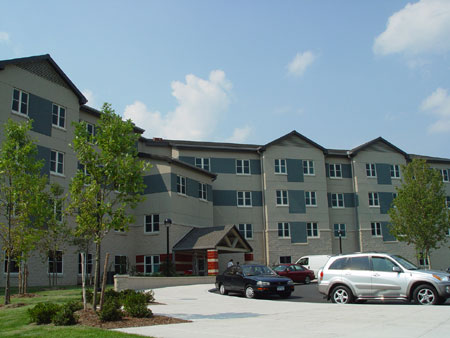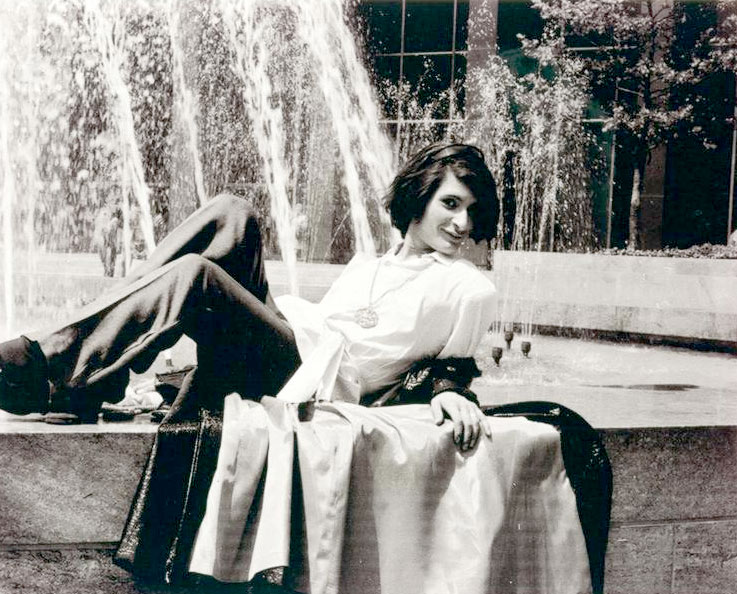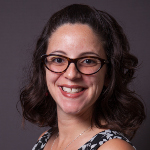Rivera House Fosters Sense of Community Among LGBTQA+ Students
The Rivera House living-learning community fills a longstanding need for support services for New Paltz’s LGBTQA+ students. A suite of dorm rooms in Lenape Hall, Rivera House, which opened its doors this fall, welcomes students who identify under the LGBTQA+ umbrella, including but not limited to lesbian, gay, bisexual, transgender, queer, questioning, asexual, pansexual, and intersexual, as well as their allies.
A steering committee led by Jessica Pabón, an assistant professor in the Women’s, Gender and Sexuality Studies Program, developed the mission for Rivera House, which includes fostering a sense of community among the residents, providing theme-based programming, and encouraging students to become change agents working on anti-racist, feminist and queer projects on campus and in the community.

Pabón has a student affairs background and founded a gender and sexuality program at Austin Community College in Texas a decade ago. She researched LGBTQA+ living-learning communities and developed promotional materials in time for this summer’s freshman orientation. She described the response to the new living-learning community as “immediate and intense.”
“Parents called saying they need to find a campus that is going to be a safe space for their queer child. Students who hadn’t come out to their parents, wrote in their [entrance] essays ‘As soon as I get to SUNY I’m going to start being who I am. I’m going to come out and I need a safe place to do that,’” Pabón recalled.
Kylie Regan ’19 (Psychology) picked up a flyer for the living-learning community at freshman orientation. From a small town in south Westchester County, Regan came out as a lesbian to her family a year ago. She came to New Paltz in search of people around whom she could be herself, much like the supportive peer group she was lucky to find in high school. “I came from a really homogenous community, and I wanted to be able to have a community of people who have all gone through similar issues that I’ve gone through,” she said.
Pabón noted that the group is striking in the number of ethnicities, languages and class backgrounds represented by the 19 current students. In naming the living-learning community after Puerto Rican and Venezuelan-American transgender activist Sylvia Rae Rivera, Pabón said she hoped to appeal directly to students from marginalized groups.

Fall programming focused on the theme of “healthy living.” Students attended a safe sex seminar and mediation session, and learned ways to manage stress and anxiety. “If you look at the statistics of LGBTQ students, and their experience within higher education, a lot of them don’t make it to graduation for various reasons – there’s a lot of anxiety, there’s a lot of stress, there’s actual physical harm,” noted Pabón. “Our idea was to give them strategies for how to cope in an environment that isn’t exactly built for [them].”
The student-led SUNY Oneonta Pride Conference last October inspired and empowered Rivera House students to become activists. Those who attended the conference have taken lead roles in organizing the spring events, which include a pop culture round-up and discussion series, queer film series, bi-monthly meditation and queer prom. Rivera House students also helped organize this year’s TRANSaction programming on campus.

Next year, Rivera House will have a peer mentoring component, with returning students paired up with incoming students to provide support and guidance. Incoming students will also take a one-credit course attached to the living-learning community, and programming will be scheduled on course meeting nights.
Pabón sees Rivera House at the “forefront” of the SUNY system’s efforts to promote diversity, equity and inclusiveness and to make SUNY the most inclusive higher education system in the country. “I feel like we’re being supported by the institution to enact a program that does the work of diversity,” Pabón said, adding, “We don’t call it a diversity program. It just is what we do. We’re working from below, as feminists would call it, taking the voices of the marginalized and trying to change the [campus] environment.”
Part of that work is simply providing a safe living environment for students to grow and learn from one another. Regan described her peers in the Rivera House as a “family” and hopes that the success of the living-learning community will provide a model for other colleges.
“Knowing that you have people out there who are going through similar things that you’re going through, and that you can connect to is a huge deal for me,” said Regan. “I had that group in high school, but otherwise I would’ve been so lost, and there are definitely people who might be lost still. Having these communities, broadening them and making SUNY New Paltz even more accepting is important, and hopefully other colleges will be doing the same. I think that’s going to help so many people.”
To read more about the Rivera House living-learning community and view the application, visit the Residence Life website.
